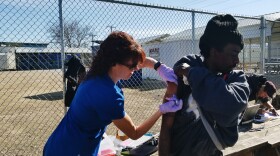Advancements in medicine have helped improve the overall health of Americans over the past several decades, but they haven’t benefited everyone.
There are still significant disparities in health outcomes that fall largely along racial and gender lines. For example, maternal deaths are increasing in Texas. And in parts of Dallas, obesity, diabetes and heart disease continue to be critical health problems.
“A health disparity is when a small segment of the population has a greater burden than the majority of the population,” said Dr. Jamboor Vishwanatha, who is the director of the Texas Center for Health Disparities at UNT Health Science Center in Fort Worth. “So it could be any race or ethnicity, as long as you are suffering the particular disease at a greater burden than the rest of the population.”
Some doctors even believe combating those health disparities would be a better financial investment than expanding medical technology.
I talked with Vishwanatha about what can be done to close glaring health gaps at the local and national levels.
Interview Highlights
Interview responses have been lightly edited for clarity.
About disparities in health
It is not something that you can just solve by fixing one issue. There are societal issues, there are personal issues, and there are physical and environmental issues. When you talk about obesity, there is a biological component to this, but there is also a component of a lack of good sources for healthy food and the ability to go take a walk, parks around you. So you have to address multiple aspects to overcome health disparities.
Why health disparities persist
There have been great advances in medicine. The number of cancer deaths is going down. Death due to cardiovascular disease is going down. So why are there still health disparities? One of the missing pieces is doing clinical trials with all of the population represented. Most of the clinical trials and new drug development is with this certain population not really inclusive of everyone. Because of a lack of participation from certain underrepresented groups in clinical trials, they may not be benefiting from some of the outcomes. On the one hand, we are advancing the field of medicine tremendously in this country, but on the other hand, we are leaving a segment of the population completely out of it.
It’s been very clear that African-American and Hispanic communities are not as well represented in the clinical trials and new drug development as other groups. That’s partly because of some history. There’s been distrust of the medical community. And I think we have to overcome that. Now, any new study or new clinical trial performed by the National Institutes of Health has to be inclusive to women, minorities and children, if necessary, to make sure that the findings are applicable to all these groups.
What has changed in light of this
Things are already changing. Several years ago, the National Institutes of Health established a national center for minority health and health disparities. Then, the realization was, “This is really very important for the country.” A few years ago, they converted the national center into a full-fledged National Institute on Minority Health and Health Disparities. There is a great national need right now — and also a great national push — to diversify the medical and biomedical workforce. What you see is underrepresentation from racial and ethnic groups. If we want to make use of all of the innovation, if we want to make use of all of the new advances in the medical and biomedical fields, we need to also make sure our workforce is reflective of our population.
What doctors and physicians can do to help
We don’t have to wait for these big national programs, but we can at our own level start working with the communities, provide the necessary education and navigation for our populations to get the benefit of medical advances.





